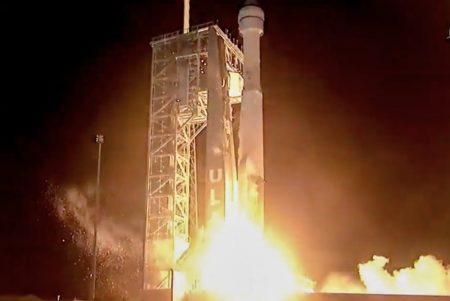December 21, 2019 – Boeing, the American aerospace giant has been having a bad year. Its bread-and-butter airplane, the 737 Max-8 has yet to be certified airworthy after two crashes that killed more than 300 passengers and crew in 2018 and 2019. Boeing in the last couple of weeks announced it was halting production on the Max-8 assembly line while it waited for system and software acceptance on the part of aviation authorities.
Then there was the Space Launch System (SLS) boondoggle with cost overruns in the billions for development of a single-use rocket for NASA’s Artemis Program. Years behind schedule, and still with no fully-assembled rocket, Boeing has demonstrated its inability to meet both physical and financial deadlines.
And now the latest, the launch of Boeing’s commercial crew module, Starliner, has run into its own problems. the uncrewed test of the Starliner launched yesterday failed to reach an orbit that will allow it to rendezvous with the International Space Station (ISS). Launched on the ULA Atlas-5 rocket (ULA is a consortium involving Boeing and Lockheed Martin) the future space taxi fired its engines at the wrong time because of an onboard clock malfunction. This meant too much fuel was used ending the opportunity to rendezvous and dock with the ISS.
For the folks at SpaceX, the other commercial space partner that NASA intends to use to ferry crews to the ISS and back, the failure of the Starliner to meet its objectives, tasted a bit sour. SpaceX is the junior partner in terms of funding in NASA’s Commercial Space Program. Boeing has received $4.82 billion to SpaceX’s $3.14 billion. Both companies have been commissioned to fly six trips to the ISS. A seat on Boeing’s Starliner will cost NASA $90 million while SpaceX will deliver each astronaut for $55 million. That compares to $86 million to buy a seat on the current Soyuz provider. Based on the numbers, it doesn’t make a lot of sense to use Boeing as a primary contractor for ISS crew delivery. But nonetheless, NASA continues to justify its commitment to Boeing as a prime commercial space partner.
The question I ask is why? It seems that Boeing cannot get many things right these days. The Starliner, like SLS, and the Max-8, has been beset with problems. First, it was reported engine problems in early testing contributing to a two-year delay in the project, then it was a parachute failing to open in an abort test, and now, in the first launch to orbit, an onboard failure that will mean Boeing on this mission will not be able to test rendezvous and docking, two essential requirements for fulfilling its crew delivery contract.
There is no doubt now that SpaceX will be the first non-government provider to give Americans a ride to the ISS and that it will happen, most likely, in the first half of 2020. SpaceX’s last test is scheduled for January 10, 2020, when they will deliberately abort a launch. As for Boeing, who knows when the company will unscramble the mess that seems to be part and parcel of its engineering efforts of late.
When asked about the latest Boeing snafu, NASA administrator, Jim Bridenstine (neither scientist, nor engineer), stated that if astronauts had been on board the Starliner would “be orbiting, or docking with the space station” now. But wasn’t this orbital test all about ensuring an extra margin of safety using automated systems in the event astronauts were somehow unavailable to take over? It seems in the age of Boeing and NASA’s current human space program, that less than perfect is becoming an accepted standard.
One only hopes that the Starliner manages a safe ground landing this Sunday, a first for American spacecraft intended for human crews. Until now all landings have been on water. The shortened mission, now only 48 hours, may provide enough useful information about the capsule’s performance in space to lessen any delay caused by the snafu.
















